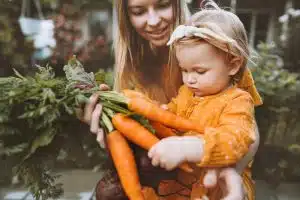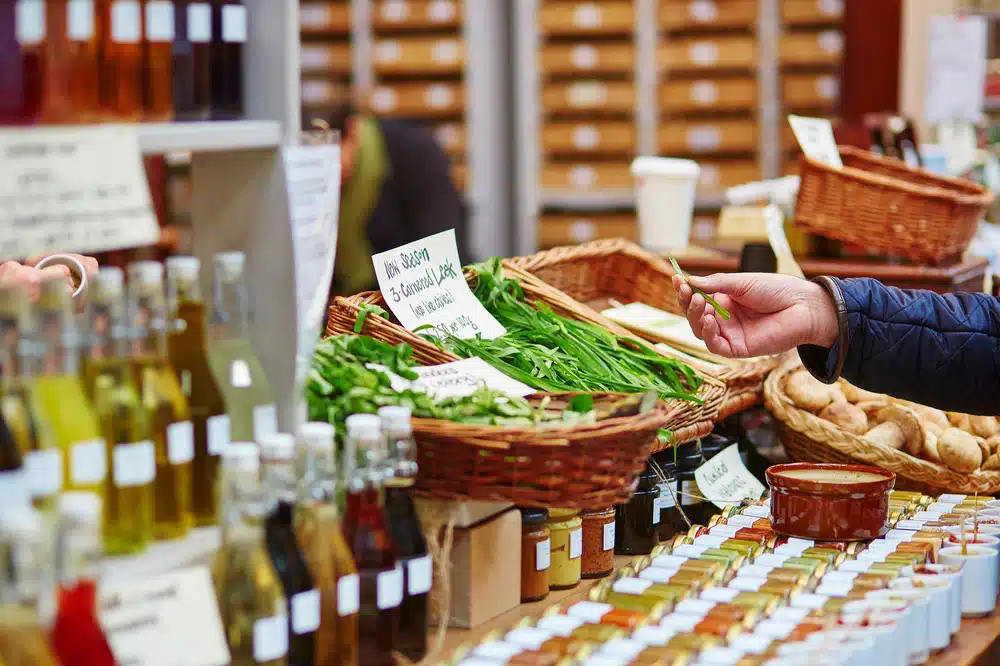
Marketplaces are also becoming increasingly popular as they offer an efficient way for farmers and producers to access customers beyond their immediate community, while potentially keeping more profits in the sector. It’s likely that the trend towards increased consumer demand for locally sourced goods and seasonal offerings will continue over the next few years, so now is a great time for farm shops to explore how they can capitalise on this emerging trend
Several thousand farm shops of various kinds have now emerged in the UK as consumers have become increasingly interested in them.
In order to survive, farmers have been encouraged to diversify. Grants may sometimes be available to help start up a farm shop, which can provide a great way to expand the business. People looking to start a modestly sized farm shop may have also found it easier with a relaxation of the ‘change of use’ planning rules from 2013 which allow for rural buildings to become shops without planning permission.
New developments
Recent food scares have led to people becoming more aware of the safety and quality of the food they eat, resulting in a growing demand for ‘wholesome’ food. According to the Soil Association, organic food was worth £2.2 billion in 2017 according to the Soil Association, after falling in the late 2000s and early 2010s. Several customers are eager to support local farmers by meeting the people who produce their food.
People have also been encouraged to buy food produced locally and in a way that is welfare-friendly because they are concerned about the environment. In recent years, many established farms shops have experienced a growth in customers as a result of this growing market.
Despite selling many products that, in a similar form, are cheaper to buy elsewhere, farm shops and farmers’ markets fared remarkably well during the late 2000s/early 2010s economic downturn. There may have been an increase in turnover of the sector because more people chose to holiday at home in the UK instead of abroad during this period rather than travel abroad because both farm shops and farmers’ markets are popular with tourists. In 2013, 2014, and mid-2010, domestic tourism increased again after dipping somewhat during 2013 and 2014. Since the beginning of 2010, the number of overseas visitors to the UK has steadily increased.
In 2015 and 2016, the economic recovery stalled after picking up in 2013. In June 2016, the EU referendum resulted in further economic uncertainty. Consumers reined in their spending in 2017 as the Brexit negotiations remained uncertain, inflation remained high, real wages grew slowly, and consumer confidence declined. This trend is expected to persist into 2018 and 2019. As the economy improves, expenditures on more expensive foods, such as organic and deli items, will likely decrease.
Farmers’ markets
It was only in 1997 that the first farmers’ market was held, but now there are a large number located throughout the country, which reflects the public’s desire for high-quality, fresh food. Quality and freshness are the main focus of weekly and monthly markets. The stallholders at these markets sell their own products directly to the public – everything on the stall should have been produced by them. It can be a great way to boost sales and raise awareness for farm shops by setting up a stall at the local farmers’ market.
Vegetable box schemes
The popularity of vegetable box schemes has skyrocketed over the last few years, similar to the popularity of farmers’ markets. Customer doors are delivered with fresh, seasonal vegetables (or sometimes to a central location). Fortnightly deliveries are sometimes offered, as well as weekly deliveries. A set price is charged for each box, although its contents vary based on the season. Fruit, dairy, and meat products are also included in some farm boxes.
Recent developments
During the past few years, there have been these developments:
- Achieving a better understanding of food quality among the public
- Environmental and welfare issues are becoming increasingly important
- The issue of ‘food miles’ (the distance between a producer and a retailer) has received increasing attention and concern.
- During the late 2000s and early 2010s, organic produce expenditure decreased for four years, followed by six consecutive years of growth, reaching £2.2 billion in 2017.
- Locally produced goods have become more in demand
- Increasing numbers of farm shops, farmers’ markets, and vegetable box schemes
- A third of households now make purchases from farm shops, according to Farm Retail Association research
The following decisions need to be made if you intend to start a farm shop:
- Your shop will be able to meet the demand
- Fresh produce shops in your area will be able to compete with you
- To compete more effectively, you need to specialise
- A niche can be identified in which you can specialise
- To attract customers from your competitors, you will offer organic produce or your own specialties
- Additional services will be offered, such as a vegetable box delivery service
- In addition to your own goods, you will sell other locally produced goods
- Adding plants, crafts, or flowers to your product line would be a good idea
Keep up to date with the farm shop sector
The Farm Retail Association is the go-to organization for farmers and growers seeking the guidance and resources they need to increase their success in the competitive agricultural marketplace. As a resource hub, they offer support through networking, education, support with farm shop legal issues and other top-notch services. In addition, members benefit from access to exclusive discounts on products and services that are important to running a successful farm business. By joining the Farm Retail Association, farmers can ensure their long-term success in this dynamic industry.
As the UK’s representative for farm shops, the Farm Retail Association (formerly FARMA) offers a variety of services to its members, including performance benchmarking, merchant services, mystery shopper visits, and supplier discounts. Additionally, they offer training and discounts from preferred partners as well as a certification scheme for farmers markets.
Conclusion
Farm shops in the UK have witnessed a considerable surge in popularity over recent years, with consumer demand for local produce and artisan products growing. This is reflected by an acceleration in new openings as well as an increase in sales turnover. While traditional farm shops focus on selling their own rural, agricultural products such as eggs, meat, and dairy there has been a shift towards mixed business models which also offer craft beers, fresh coffee, and locally made arts and crafts.
Indeed, savvy farmers are embracing this trend by seeking new ways to diversify income sources and remain competitive against the supermarkets. Going forward it seems that sector trends could see increasingly sophisticated offerings become commonplace within farm shops as customers clamour for integrated experiences encompassing food, shopping, entertainment, and education.
Lee Jones is a seasoned Business Finance Specialist with over two decades of invaluable experience in the financial sector. With a keen eye for market trends and a passion for helping businesses thrive, Lee has become a trusted advisor to countless organizations seeking to navigate the complexities of finance.


